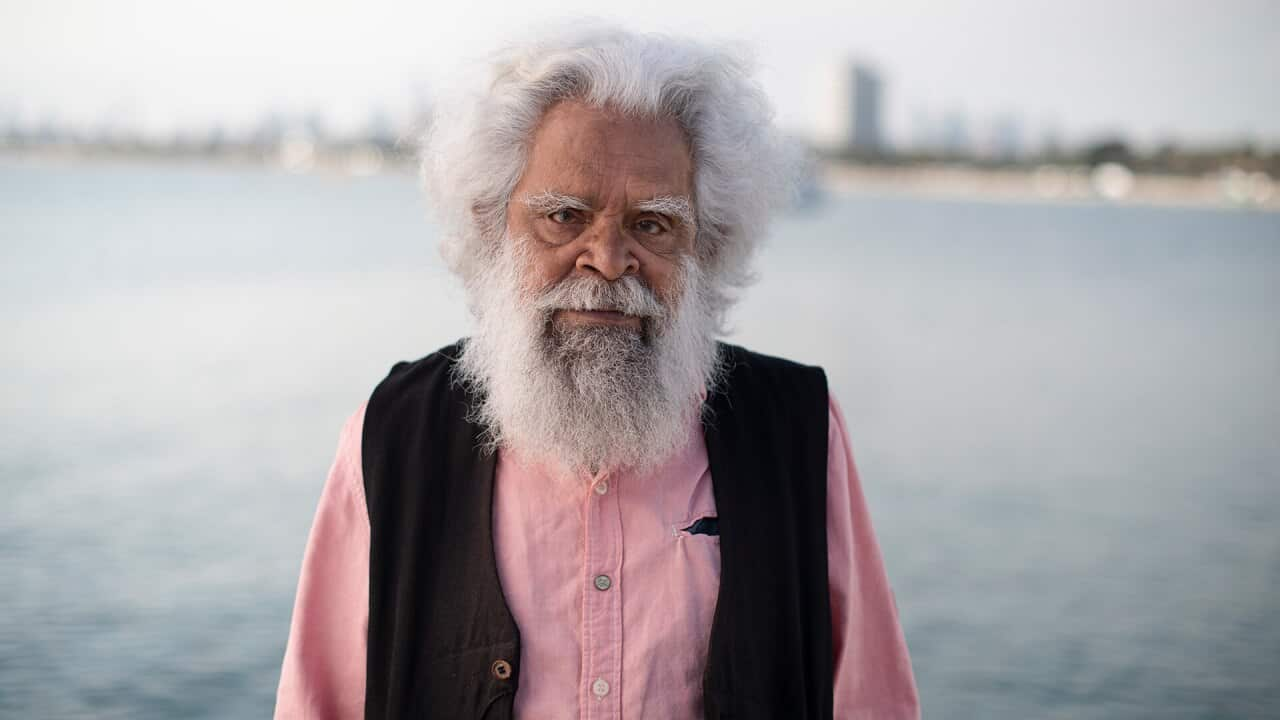The beloved star of stage and screen Uncle Jack Charles has passed away peacefully surrounded by loved ones.
In a statement, his family stated that the 79-year-old legend had suffered a stroke, before passing away at the Royal Melbourne Hospital Tuesday morning.
"We are so proud of everything he has achieved in his remarkable life," reads the statement.
"May he be greeted by his Ancestors on his return home."
The family have given permission for his name and image to be used.
The Boon Wurrung Dja Dja Wurrung Woiwurrung Yorta Yorta Elder is well known to generations of Australians as the actor with the treacle vocal cords, his rich baritone the soundtrack to innumerable plays, television programs and movies.
His activism for Aboriginal and Torres Strait Islander progress, especially regarding the Stolen Generations and education, was also an unfailing part of his efforts.
Before he passed away, his family were able to send him off on Country during a smoking ceremony at the Royal Melbourne hospital.

Uncle Jack Charles was named 2022 NAIDOC Male Elder of the year. Source: Getty / NITV
A tough start to life
Charles was born at Cummeragunja Reserve on September 5 1943 to a rich family pedigree; his great-great-grandfather had been part of the Blak political royalty who resisted government intervention into Aboriginal lives at Coranderrk reserve in Victoria.
His five-times great grandfather, Mannalargenna, was a highly respected Elder of his people, and acted as ambassador and emissary to surrounding clans.
A member of the Stolen Generations, Charles was removed from his family at just four months old.
He was eventually moved to the Box Hill Boys' Home, where he suffered abuse by staff and other boys during his 12-year stay. He would not meet his mother until he was 19 years old.
Finding his calling
Charles entered the acting business in 1970, cast in a production of 'The Blood Knot' at New Theatre Melbourne.
With no formal training to his name, it was nonetheless the beginning of a long and illustrious career.
He appeared in dozens of productions. A lifelong proponent of the stage, and a driving force in the establishment of Aboriginal theatre, Charles was also versatile, and scored his first film role in 1978, playing Harry Edwards in 'The Chant of Jimmie Blacksmith'.
His voice resonated through Australian households in any number of documentaries, educational videos, podcasts and more, the regal tones of his deep voice offset by a tell-tale whistle on sibilant sounds, a nod to the cheeky that was reflected in bright eyes.

Uncle Jack holds a historical drawing of his ancestor Mannalargenna. Source: SBS
Activism
Not content with six decades of roles treading the boards and the small and silver screen, Uncle Jack Charles also dedicated much of his life to activism, furthering the causes of Aboriginal and Torres Strait Islander people and speaking up for the forgotten and downtrodden of society.
He was on the Board of Directors at the Archie Roach foundation, using his first-hand to mentor and support young people caught up in the recidivist prison system.
Education was also a passion of the Elder: in recent years he advocated not only for an overhaul of the Victorian education system to better reflect the horrors of colonialism, but also for a state and nation wide truth-telling commission.
An openly gay man, he was also an icon for many queer people across the country.
"I have no problems being a gay and old arty bloke," he said last year.
Continuing to make history
In April this year, Charles was the first Indigenous Elder to appear before the Yoorrook Truth-Telling Commission, sharing his personal story of loss and trauma before the forum he was instrumental in establishing.
He spoke of the "cruel and callous punishments" he suffered at the hands of institutions after his forced removal from his family.
“I wasn’t even told I was Aboriginal," he said.
"I had to discover that for myself. I knew nothing, was told nothing, and had to assimilate ... I was whitewashed by the system."
In a strange and distressing incident, Charles was asked in June this year to 'prove' his Aboriginality by the Victorian government's Stolen Generations Reparations Scheme.
Charles said he was 'retraumatised' by the event. Following enormous public outrage and backlash, the request was rescinded.
In a happier turn of events, that very same week, Charles was awarded NAIDOC Male Elder of the Year in recognition of his many and various achievements.













